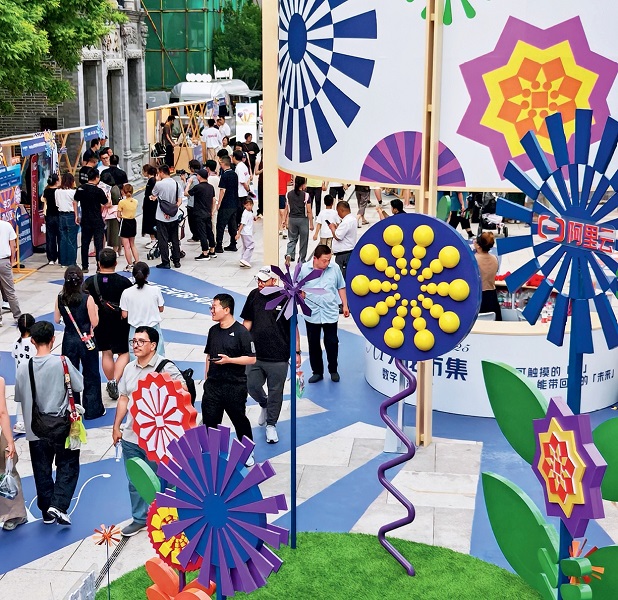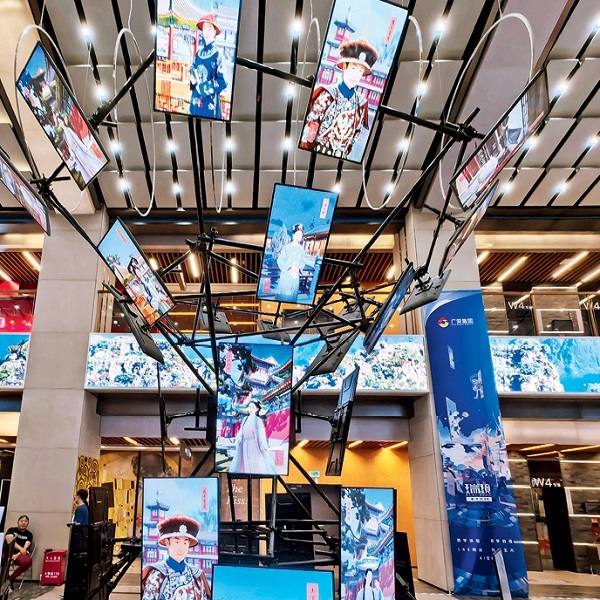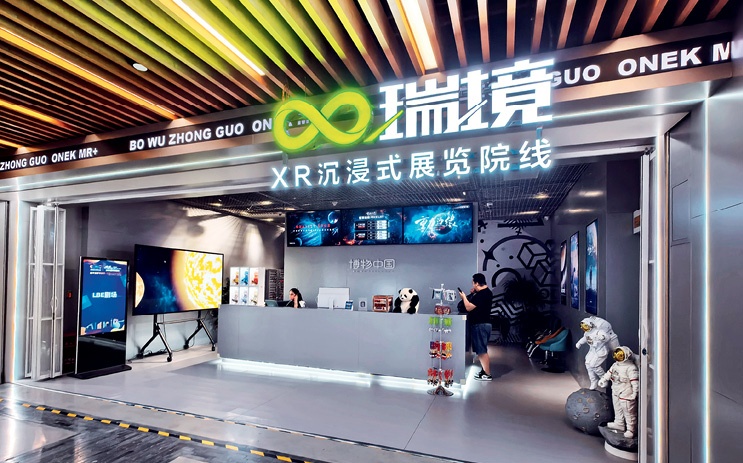Beijing defines a new model for digital-friendly cities where technology meets people’s needs and global cooperation drives inclusivity.

More than 50 tech firms showcase their cutting-edge AI products and services at the open-air AI Spark Bazaar at the Beijing FUN Digital Complex, a vibrant pedestrian street in the historic Qianmen area of central Beijing, on June 28, 2025.
The 6,000-square-meter Beijing FUN Digital Complex, a vibrant pedestrian street in the historic Qianmen area of central Beijing, was bustling with visitors during the 2025 Beijing Digital Economy Experience Week, held from June 27 to July 5. Some climbed into a full-size C919 flight simulator, while others put on a domestically-made 8K VR headset to test a real-time voice-interaction model, immersing themselves in a dazzling virtual world.
“More than 50 tech firms have set up over 10 immersive zones here, allowing visitors to experience the deep convergence of digital technologies – artificial intelligence (AI) and the Metaverse – with cultural creativity,” said Ji Jing, deputy secretary-general of the Beijing Informatization Association and executive secretary-general of the Metaverse Innovation Development Committee.
These activities embodied the theme of the 2025 Global Digital Economy Conference – Building a Digital-Friendly City – and highlighted the “citizen-friendly” ideal: digital products and solutions should be designed to make a difference in people’s lives.
The 2025 Global Digital Economy Conference brought together representatives from more than 50 countries and the World Trade Organization to share ideas for the global digital transition.

The immersive zone allows visitors to experience the deep convergence of digital technologies – artificial intelligence (AI) and the Metaverse – with cultural creativity during the 2025 Beijing Digital Economy Experience Week, held from June 27 to July 5, 2025.
 For a Better Life
For a Better LifeDuring the opening forum titled “Global Dialogue on Digital-Friendly Cities,” Beijing unveiled its Top 10 Benchmark Applications of the Digital Economy, spanning areas such as smart governance, digital health care, autonomous driving, cultural heritage protection, and digital audiovisual services – all living proof of what a digital city can offer.
Jingban, an inter-agency office platform, exemplifies how digital technology is reshaping modern governance. Serving as a unified work portal for government staff at municipal, district, sub-district, and community levels, it supports the smooth operation of digital government and enables citizens to access services with less hassle. Covering all of the city’s districts and 114 municipal agencies, the platform allows civil servants to collaborate across departments simultaneously, enabling rapid responses to urban emergencies, grassroots governance needs, and public health crises.
Another flagship application is the resident-centric Beijing Intelligent & Digital Healthcare Full-Process Service. It includes a city-wide hospital platform that handles 150 million appointments per year, along with AI general practitioners and AI pediatricians. The unified system is connected to 299 secondary and tertiary hospitals in Beijing. Its dynamic scheduling has reduced idle appointment slots by 20 percent, and smart algorithms can detect and block scalper bots. “I used to go to the hospital before dawn to queue for an appointment and had to fight scalpers,” said Huang, a woman from Yayuncun in Chaoyang District. “Now I use the Jingtong mini-app at home and book an appointment.”
In the Beijing Economic-Technological Development Area, traffic lights that used to have their settings changed only once or twice a year are now automatically fine-tuned up to 135 times a day at a single intersection. This is part of the resident-friendly concept that is having the lights respond to real-time traffic flow. Thanks to this smart system, even though traffic has increased by 20 percent, average driving speed has gone up by 15 percent.
“These innovative applications meet the daily needs of residents,” said Jiang Guangzhi, director of the Beijing Municipal Bureau of Economy and Information Technology. “By using the entire city as a super test bed, Beijing is setting a new benchmark for China’s digital economy – letting technology enrich people’s lives and drive urban development.”

Visitors put on a domestically-made 8K VR headset to test a real-time voice-interaction model, immersing themselves in a dazzling virtual world.
Powered by AI
To bring the digital economy to life, the conference hosted an open-air AI Spark Bazaar filled with cutting-edge AI products and services. Visitors could explore smart wearables, digital cultural creations, AI-powered toys, and online learning platforms. Children interacted with AI companions, students tried personalized AI tutoring, and office workers tested productivity tools powered by AI.
Zhang Zhiheng, general manager of Beijing Guang’an Xuanguang Technology Co. Ltd., said the Beijing FUN Digital Complex and the AI Spark Bazaar offer a valuable platform for small and medium-sized tech companies. “They allow everyday citizens to experience the latest smart technologies, making innovation truly serve people’s lives,” he explained.
As the digital economy expands, its ecosystem is maturing. Frontier technologies like AI and the Metaverse are increasingly integrating with culture, sports, and daily life, making digital consumption a powerful driver of industrial upgrading.
This year’s government work report pledged to continue the “AI plus” initiative, which aims to combine digital technologies with China’s strengths in manufacturing and market scale. The focus is on supporting large AI models and developing next-generation smart devices, smart new energy vehicles, AI-powered smartphones and PCs, smart robots, and intelligent manufacturing equipment.
According to the National Data Administration, China made significant progress in 2024 in areas such as integrated circuits, AI, and industrial software. The number of companies developing or applying AI grew by 36 percent year on year, while the stock of high-quality datasets – critical for training and deploying AI – increased by 27.4 percent.

Ruijing Space, the XR immersive exhibition cinema, creates an immersive digital environment through cutting-edge technologies such as AI and Metaverse.
Toward an Inclusive Digital Future
As the world goes digital, the digital economy has become a key driver of socio-economic development. In the 14th Five-Year Plan period (2021–2025), China’s digital economy progressed to a new level, featuring stronger integration with the real economy, enhanced regulation, and more inclusive growth. In 2024, China’s key digital sectors continued their growth momentum, maintaining the country’s position as the world’s second-largest digital economy.
As the nation’s center of innovation, Beijing launched an initiative in 2021 to position itself as a global benchmark in the digital economy. By 2024, the value added of Beijing’s digital economy reached RMB 2.2 trillion – accounting for 45 percent of the city’s gross domestic product. High-growth industrial clusters such as those of intelligent connected vehicles and AI reflect the city’s digital transformation and effective governance.
The Beijing Digital Economy Development Report (Blue Book), released on July 5, ranked Beijing second globally on the overall benchmark-city index, placing it among the world’s front-runners. In the first quarter of 2025, Beijing’s digital economy grew 8.3 percent year on year, with the growth of core industries up 9.7 percent.
“Beijing is home to enormous scientific resources and innovative enterprises,” said Bi Juan, deputy director of the Institute of Management Studies at the Beijing Academy of Social Sciences. “Its digital economy innovation index leads the nation, with strengths across industry, governance, data allocation, infrastructure, and innovation resources.”
At this year’s Global Digital Economy Conference, Beijing called for building a digital-friendly city — a goal that is, in the words of Xu Xinchao, deputy secretary-general of the Beijing municipal government, “ultimately people-centered and aimed at benevolent intelligence.”
Global collaboration is another key focus. At the conference, Beijing and partner cities from Europe, North America, the Asia-Pacific, the Middle East, and Latin America launched the Global Digital Economy Cities Alliance. Its goal is to expand collaboration from bilateral initiatives to broader multilateral efforts in areas such as digital infrastructure, data governance across borders, ethical use of AI, and smart city innovation.
Zhang Xiangchen, deputy director-general of the World Trade Organization, noted that although the value of global digital services has reached as high as US $4.5 trillion, gaps in digital access and inclusion persist. He called for fairer global digital policies and greater assistance for developing nations to strengthen their digital capability.
His concerns were shared by several international participants. Lluís Soler i Panisello, mayor of Deltebre, Spain, advocated greater cooperation on the digital transformation of tourism and agriculture to ensure wider benefits. Durdona Rakhimova, deputy mayor of Tashkent, Uzbekistan, praised Beijing’s digital health services and AI-powered education tools, expressing hope for deeper cooperation. “We want every resident to share in the rewards of the digital future,” she said.